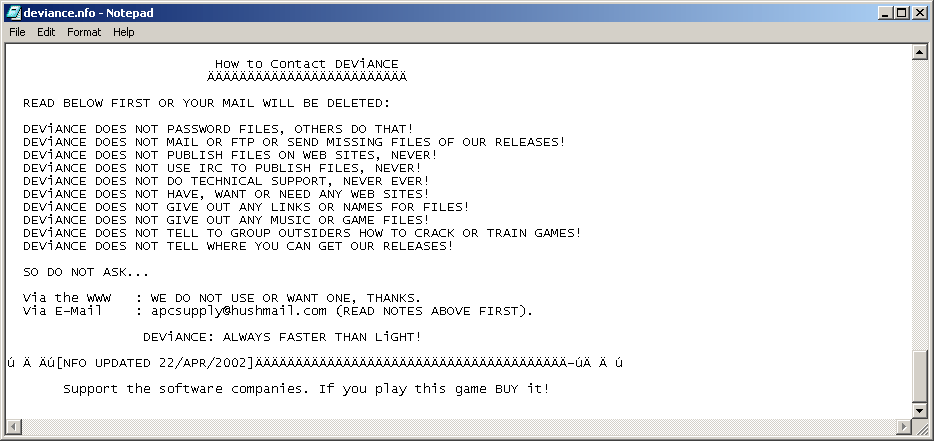
Cracking:
There are groups of people who crack video games for fun. They form cracking groups that they call “groups”. However, these groups are sometime known as clans. For this research project I have adopted to use “clan” as the nomenclature for referring to these cracking groups. These clans give themselves a name and develop an entire little community of people. They try to be the first to come out with a crack to a video game and distribute them. Not only are video game manufacturers trying to pump out the coolest video games the fastest, the cracking clans are trying to crack them better and faster than the other clans. The subversive cracking clans take as much pride in their work as their legal counterparts.
If cracking is to some degree a political message (i.e. anti-corporate), then can these Clans be considered revolutionaries? To some extent these crackers are not just doing it for free video games. There is a political message against security and copyright laws. These people do it for fun, because they want to. There is also a sort of Cloak and Dagger element where the Clans try to break and find ways around the newest security features, while avoiding the FBI and corporate lawyers. There is also competition and pride to see which Clan is able to crack and distribute the cracks first. The cracks are distributed as "warez". Warez, however, does not imply video games alone, but to any application that has been cracked. The difference between warez and cracks is that a crack implies the actual crack breaks the software anti-pirate protection. Warez is a distribution that includes not just the crack, but the actual piece of software itself. So, a person could own a legitimate copy of a game and just want the crack so they do not have to put in the CD every time they play the game. The warez is the illegally distributed copy of the game with accompanying cracks. For reasons of clarity, in these articles I have adopted the term crack to imply both the crack and the distributed game. This is so there is less confusion about the definitions of the two for the reader.
What A Clan Might Look Like
The community consists of a wide variety of people from different professions. First off the community has game distributors. These are the people that can supply the game even before it comes out. These people who get these unreleased games might work at/for:
These suppliers may or may not have a fast internet connection. However, they are looking for at least one of these suppliers to have a fast internet connection (better than cable or DSL which can be capped at any time). They are looking for consistent internet connections presumably to upload the games to the crackers.
There is not usually a single person who does all of the game cracking since the process to crack a game involves various stages. The first line of crackers removes the security protection from the CDs (see cracking section ADD LINK). These people have to be up on the latest methods that companies are using in order to insure that their games are not duplicated. The requirements for the DEViANCE clan include:
You are willing to help defeating the latest versions of commercial iso (add a link to describe .iso and .bin/.cue files) copying protection systems like Safedisc 2+ or Securom or Tages or VOB or Copylok or Laserlok. You must be able to code in assembly language
-DEViANCE -> from a .nfo file updated from
The next string of crackers has to be able to debug the actual game code that might have other security protections or checks. These checks by the original game publishers might include checks that ensure original game CD is in the CD-ROM drive or even password protection. These coders are expected to create tools based on the work of the first string coders that can automatically strip CD security protection to create disc images of the games. Usually they will have another cracker that will be in charge of unpacking and packing all of the major game file types.
The community also has their own version of border patrol. What community would be secure without some kind of a bodyguard? This is one of many examples of how this subculture actuall mirrors American culture. Their "home" is like a gated community, an exclusive Country Club, or even like a small country. The communities have UNIX gurus who enable and enforce the latest technologies to prevent network vulnerabilities. The must ensure that the networks are not hacked or sniffed by an outside source (possibly government or corporate agencies).
The last group of members is the trainers. These are people that create cheats for the games. They also develop tools for users to create their own cheats for games. Some cracked releases of games will come with trainers or cheats for users to play around with.
 |
Most clans have rules or laws about their work. For example a few of the clans mention that their files are never password protected, they never advertise or distribute on websites, they do not distribute to large distribution channels, they will not distribute to any individual, and they will never tell an interested party where to get any of their game distributions. |
Similarities and Rivalries
For as much as they have in common they also have rivalries between them to see which clan can release the games first. For example the week of May 20th – May25th was a big week for the clans due to the popularity of the games that were scheduled for mainstream release. Two different big title game sequels for the PC, Grand Theft Auto III and Soldier of Fortune 2 were officially released by their respective publishers within 1 day of each other that week. This meant that there was pressure from the clans to get the cracked games out right away. There is an interesting parallel here between the capitalist competition between corporations to publish their software first and foremost and the competition between the clans to produce the cracked game better and faster than their competition. I witnessed on May22, 2002 the posting of the results from the race to crack Soldier of Fortune 2.
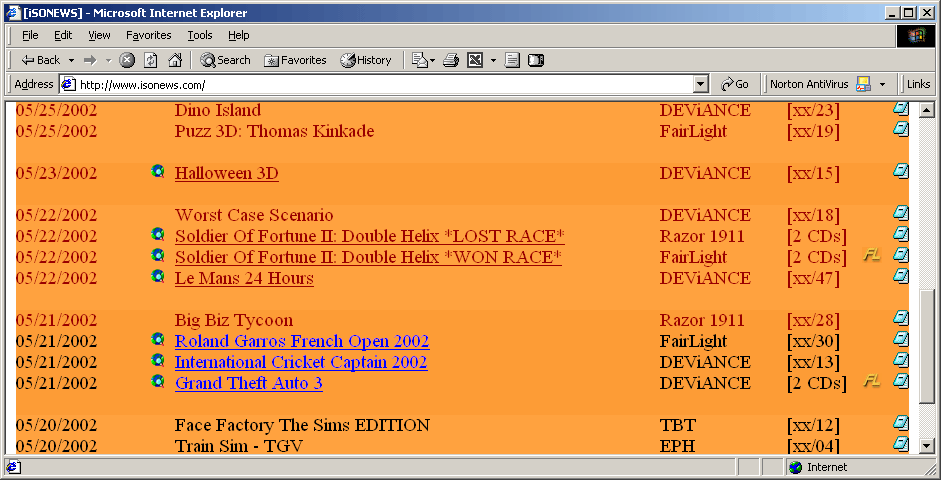 |
The winner was FairLight who is highlighted to have “*Won Race*”. The runner up, Razor 1911, is mentioned to have “Lost Race”. (Insert the win_loose.gif). |
The clans have checks to verify that the copy that you get is a “legitimate” copy put out by the clan that did it. This is to ensure that other people do not try to take claim for their work. For example, if another clan or person was to tamper with the file in any way, the little check program will know and inform the user whether or not they are in possession of an official x clan release. These clans are putting a corporate logo or trademark on their product (i.e. the cracked game) much like a corporation like EA sports or Rockstar Games (computer game makers). It is ironic that clans mimic the logo and trademarks used by corporations, which are the exact entity that these clans purport to fight against. This is just one of many ways that these clans are like coprporations. However, these crackers do not do any of their work for money.
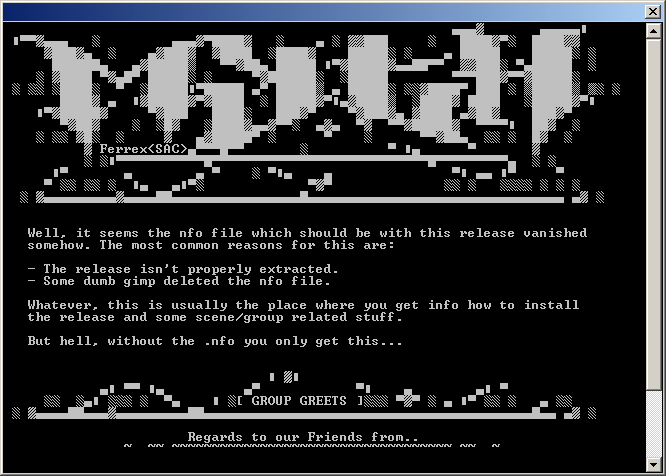 |
These logos havethe effect of creating a quality seal on the product. For instance, if I know that Myth always puts out reliable cracks, I would not want to get a version of Myth’s cracked game that has been tampered with. I might also choose to support Myth above any other clan and distribute their cracks of games as opposed to distributing Razor1911 cracks. |
However, each clan does not put out a crack to every game. For instance DEViANCE put out the cracked version of Grand Theft Auto III (GTA3), along with International Cricket Captain 2002, on May 21st while Razor1911 put out a cracked version for Big Biz Tycoon and FairLight put out Roland Garros French Open 2002 on May 21st, but both clans put out Soldier of Fortune 2(SOF2) on May22nd. DEViANCE also released 2 games on the 22nd, which were Worst Case Scenario and Le Mans 24 Hours. The groups pick and chose which games they are going to crack, and realize that there is no way that they can keep up and crack every single game. As can be seen, each of the groups was able to put out a crack to the two largest games, GTA3 and SOF2. They were also able to put up cracks to a couple of other games within this 2 day span. These games are a lot smaller and lower budget. Thus, I would assume that they have less security features and therefore require less time to crack.
Of course the stiff competition sometimes leads to mistakes. Unlike multi-million dollar corporations, clans do not have a Quality Assurance (QA) phase. This is probably due to lack of resources and lack of time. As a result, anything can go wrong. Sometimes, the clans only have a day or two to get the game cracked and on the market. That is why they are looking for people to join their clan who can get the games as early as possible. As a result, sometimes the clans have to issue patches for their cracks. But, even multi-million dollar software companies put out patches. Microsoft is multi-billion dollar industry and they put out patches for their software all the time. So, I advocate that these crack patches be referred to as crack 1.1.
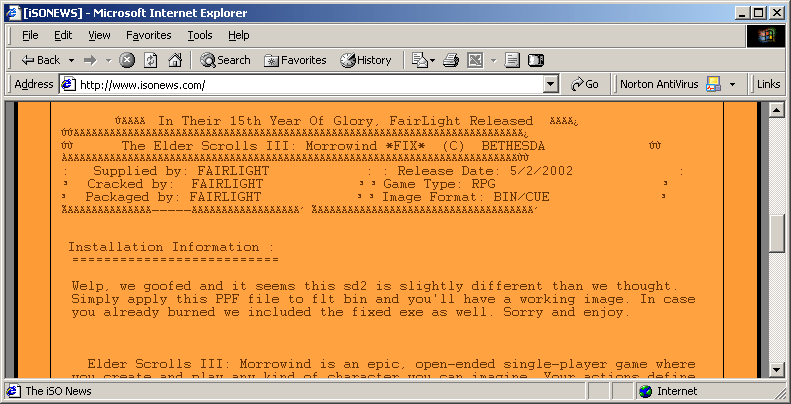 |
In the case of GTA3, there was such a rush that there as even two patches. But, even less popular games like Elder Scrolls III: Morrowind had a 1.1 revision. (insert ES_fix.gif). |
The Logos as identity & The structure of the .nfo
Anothger way that these clans mirror corporate culture is their logos. The logos are displayed in a file with the extension .nfo. The player must use notepad or some other text editor to open up the .nfo file to read its contents. This file contains all of the information about the crack and and about the game that has been downloaded. These .nfo files may also contain such information as serial numbers to use in case the game requires one. .nfo file can be found for download at www.isonews.com
Follow this link to see some of the logos and .nfo formats.
How Clans Fit or Don't Fit Into Mainstream Culture
First, let's talk about how video game cracking has or has not come into mainstream culture. Dick Hebdige talks about the origins of subcultures in his book Subcultures: the meaning of style.
Deviant or ‘anti-social/ acts… are ‘discovered’ by the police, the judiciary, the press, and these acts are used to explain the subcultures original transgression of sartorial code.
Most people do not realize that game cracking has been going on for years, since the 1980’s. Look at the Fairlight logo that boasts over 15 years of experience. I remember by first encounters with cracked software when I was 10 years old at my friend’s house. We were using his modem to connect to a Bulletin Board System (BBS). These BBSs posted, among other things, pirated copies of software. Back in those days of 5.25” floppy drives, there was almost no kind of copy protection on the game CDs. This is possible because the PC computer game industry was nothing compared to the monstrosity that it is today.
At the age of 10 I was playing pirated copies of Zork at my friend’s house. There was never any media mention of these BBSs. However, as mainstream video game playing emerged in the PC market, things began to change. With the use of the internet was inducted into mainstream culture, hacking became an every day word. The hacker is someone to be feared. They are dark little trolls that have nothing better to do then sit around and hack into your email box and read your personal letters.
Consequently, any form of hacking has come under scrutiny and this includes the hacking (cracking) of video games. The media has caught on and hyped the hacker as an enemy of the people. The hacker, according to mainstream culture, is anti-social and seeks to undermine the very fabric of society. Consequently any “style” of hacking is considered bad. . However, some game developers have taken a more positive attitude toward video game pirating.
The press and the corporations try to explain the reasons for video game hacking. All literature in the mainstream press is biased. It all points to video game cracking as anti-American. The justification that they give is that people just want a free ride. That is to say, the media tries to explain that pirating stems from people’s desire to get something for free. The media and corporations try to play the “poor me strings” with information like $3.2 billion dollars was lost to the video game industry due to pirating. But there is no way that they could justify those numbers. After talking with a friend who plays pirated software (he wishes to remain anonymous), he says that he would not buy the games that he has stolen. In other words, the game companies are making the fallacious argument that users, when they are pirating, are not buying. But the truth of the matter is that a pirate might download three games to play, but that does not mean that they are stealing instead of buying. Players do not have the money to go out and spend $60 per video game, especially when the majority of players are kids and college students
But, what the mass media and corporations do not
understand is that pirating is a form of rebellion. These groups that crack
video games are sending a message of anti-corporate
An article in the LA Times illustrates this point by pointing out that pirating
is the people’s only chance to send a message to the out of control corporations
that we just are not going to take it anymore:”. It was written
on
Store aisles and the Internet are becoming vents for popular anger over corporate greed...
You can see it at the grocery store with avocados and bananas that have
been squeezed hard with the intent to ruin them, or in the finger holes that
penetrate the plastic packages at meat counters. I read it almost every day
in my mail. People say it is their justification for stealing music and movies
and software over the Internet.
Consumers are mad, and some are declaring petty war against the mighty corporation,
against the shenanigans, the double-dealing, the get-rich-quick schemes, the
fraud, the self-serving deals--the corporate wrongdoing
that splashes into the daily headlines and mocks American values.
You don't have to be a retail vandal or an Internet pirate to understand the
ground-level frustration of citizens. It creeps into many, if not most, of the
conversations I have with friends, sometimes with startling ferocity.
Americans, if I can generalize, are feeling powerless
right now. Not just against the threat of terrorism but against the overindulgences
of their own free-market system and the stubborn indifference
of
One of the promises of democracy, the essential promise, is that it will react to crisis...
If you follow this article is to its logical conclusion, then internet pirating is actually a product of democracy. It is the people responding to the crisis of corporate greed and fraud. It is this subculture that expresses the underlying values of American culture.
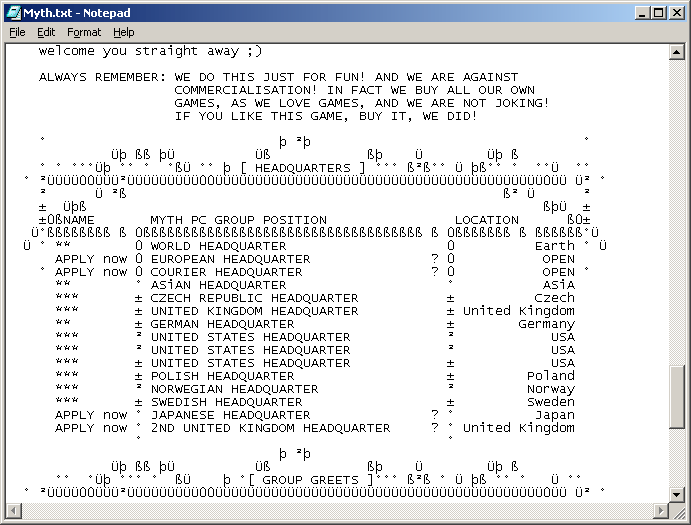 |
The top specifically spells out that the crack are done with an anti corporate messge. Are these clans really the vangaurd of the people? There is definately a message that these corporations should be getting and that it is that the people are fed up with corporate abuses and greed. |
Follow this link to see how cracking will save capitalism!